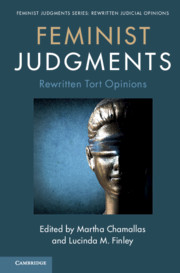Book contents
- feminist judgments: rewritten tort opinions
- Feminist Judgments Series Editors
- Feminist Judgments: Rewritten Tort Opinions
- Copyright page
- Contents
- Notes on Contributors
- Preface
- Table of Cases
- Part I Introduction
- Part II The Classics
- Part III Intentional Torts
- 6 Commentary on Robinson v. Cutchin
- 7 Commentary on Guthrie v. Conroy
- 8 Commentary on Lyman v. Huber
- 9 Commentary on Sipple v. Chronicle Publishing Co.
- Part IV Negligence and Vicarious Liability
- Part V Damages
- Index
7 - Commentary on Guthrie v. Conroy
from Part III - Intentional Torts
Published online by Cambridge University Press: 28 November 2020
- feminist judgments: rewritten tort opinions
- Feminist Judgments Series Editors
- Feminist Judgments: Rewritten Tort Opinions
- Copyright page
- Contents
- Notes on Contributors
- Preface
- Table of Cases
- Part I Introduction
- Part II The Classics
- Part III Intentional Torts
- 6 Commentary on Robinson v. Cutchin
- 7 Commentary on Guthrie v. Conroy
- 8 Commentary on Lyman v. Huber
- 9 Commentary on Sipple v. Chronicle Publishing Co.
- Part IV Negligence and Vicarious Liability
- Part V Damages
- Index
Summary
Guthrie v. Conway exemplifies the reluctance of many courts to allow victims of workplace sexual harassment to sue in tort for intentional infliction of emotional distress (IIED). The employer in Guthrie escaped liability because the court did not regard numerous incidents of harassment as sufficiently “outrageous” conduct to justify tort recovery. The rewritten feminist dissent explains how courts often misuse summary judgment in hostile workplace environment cases and argues for a contextual application of the elements of IIED based on the victims’ experience. The feminist dissent would allow a jury to review the evidence in its totality, would not require the harassment to be overtly sexual to qualify as outrageous conduct, and would permit a tort claim regardless of whether the victim also had a viable claim under Title VII of the 1964 Civil Rights Act. The accompanying commentary catalogues the various techniques courts have used to exclude feminist perspectives in harassment cases and urges a greater role for tort litigation.
Keywords
- Type
- Chapter
- Information
- Feminist Judgments: Rewritten Tort Opinions , pp. 147 - 171Publisher: Cambridge University PressPrint publication year: 2020

